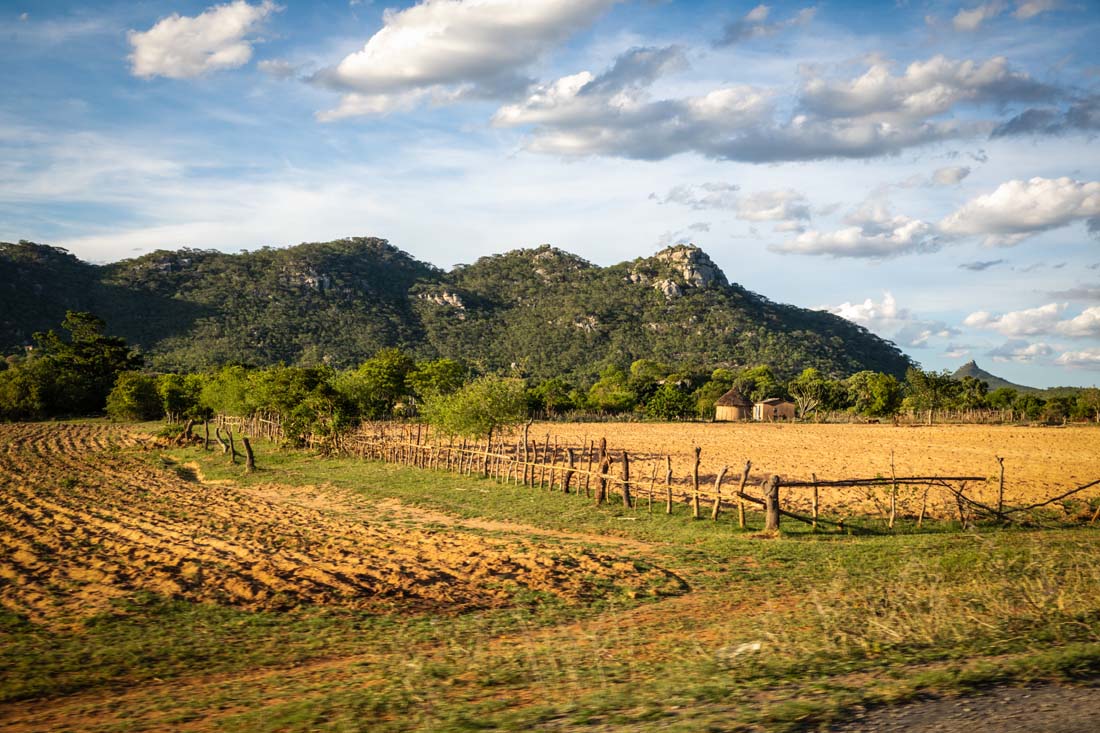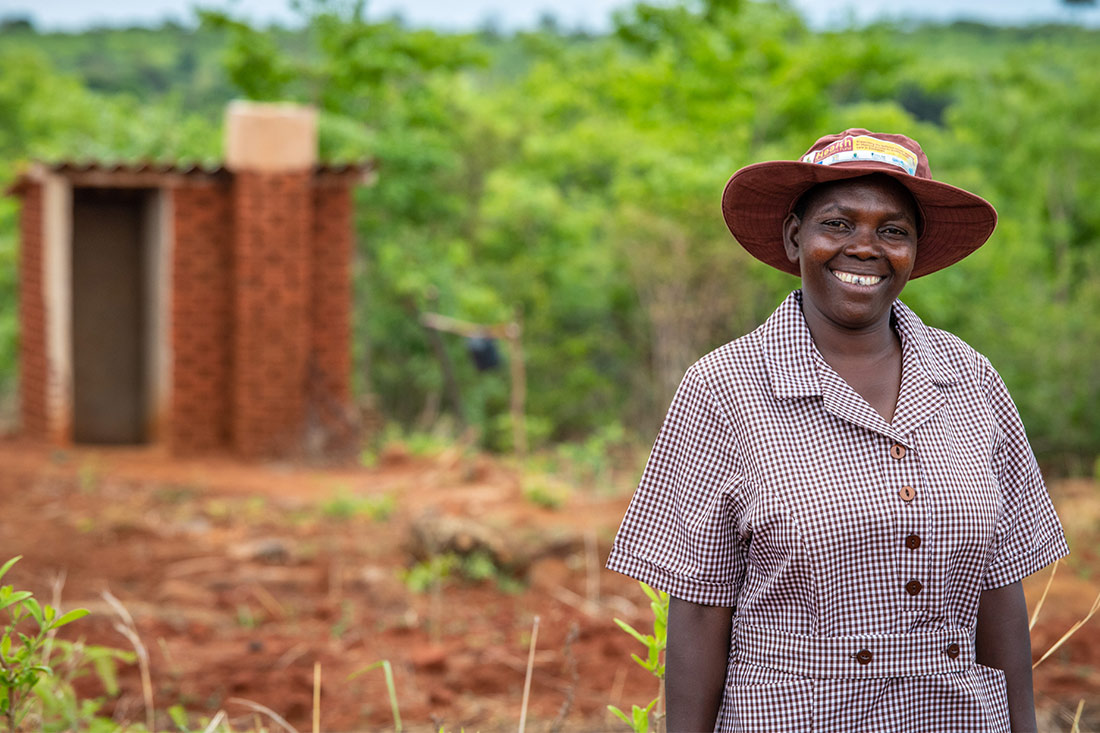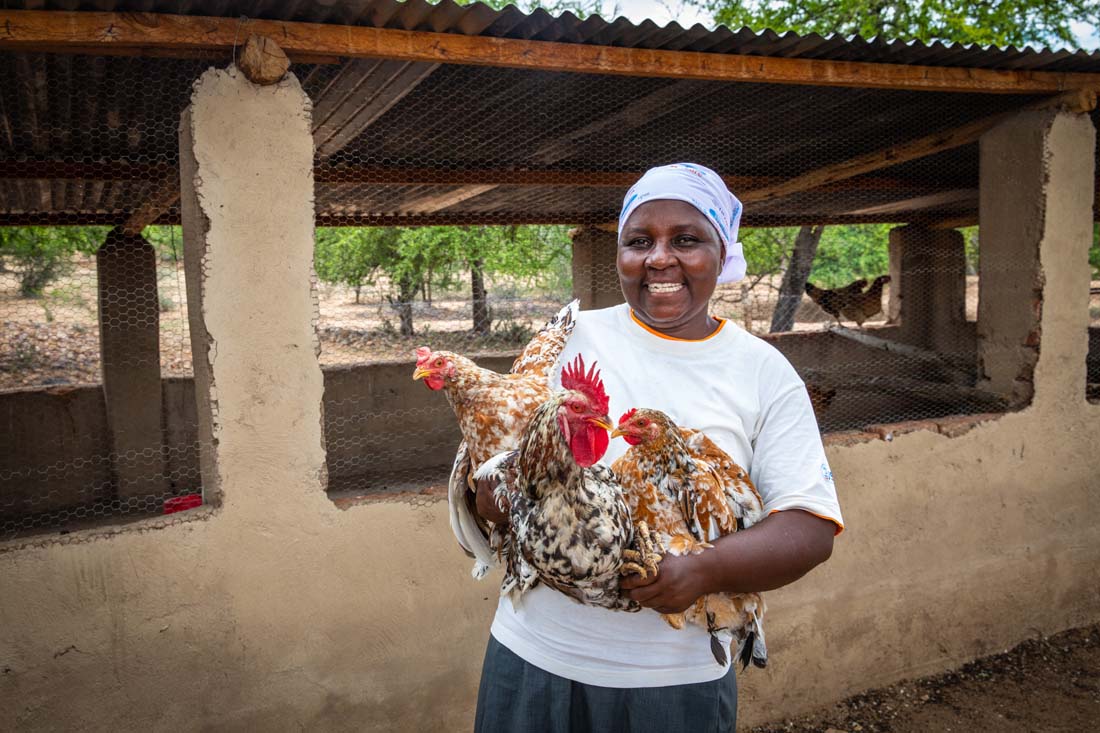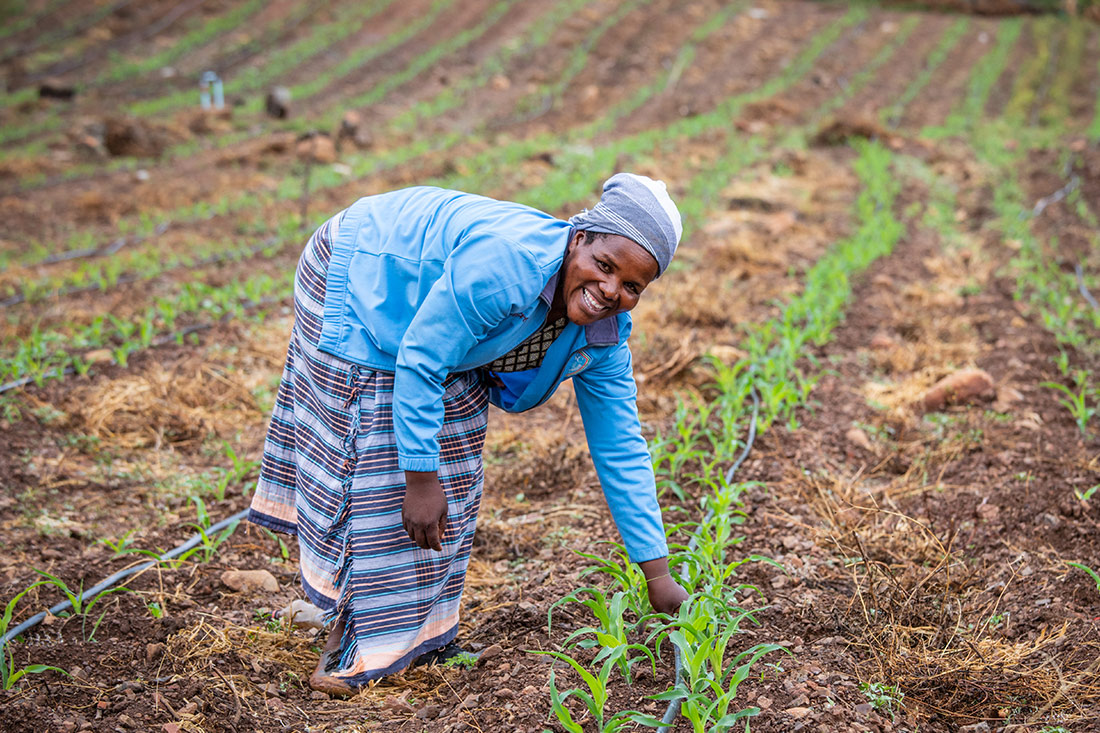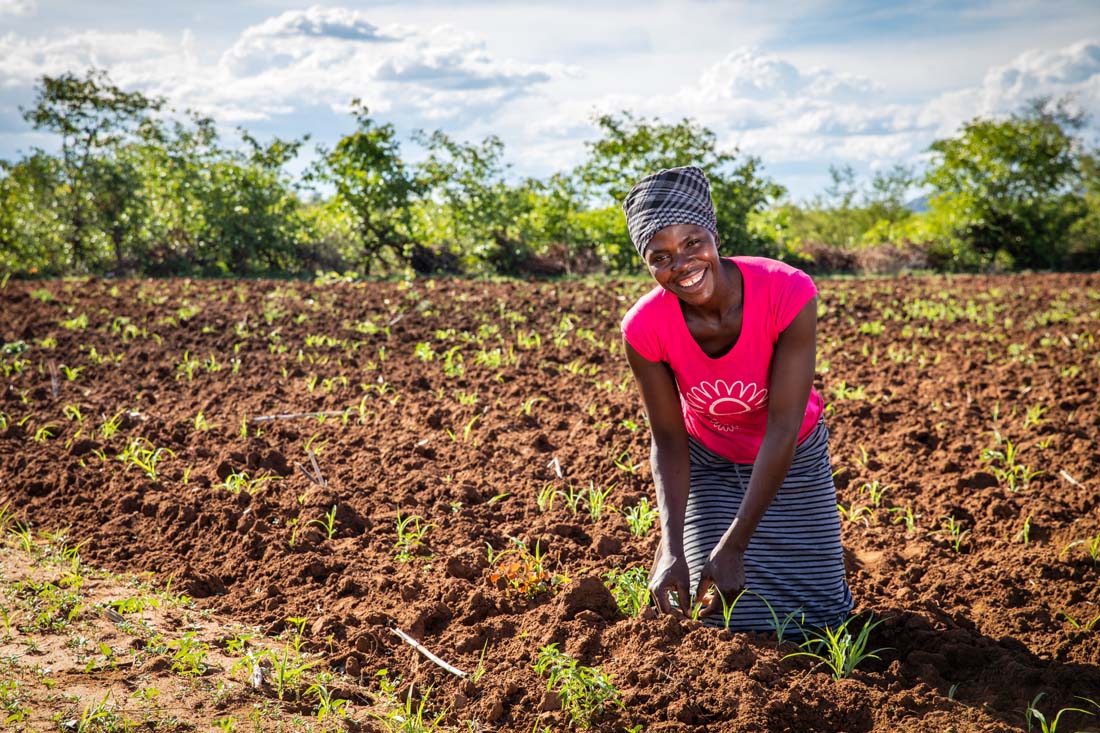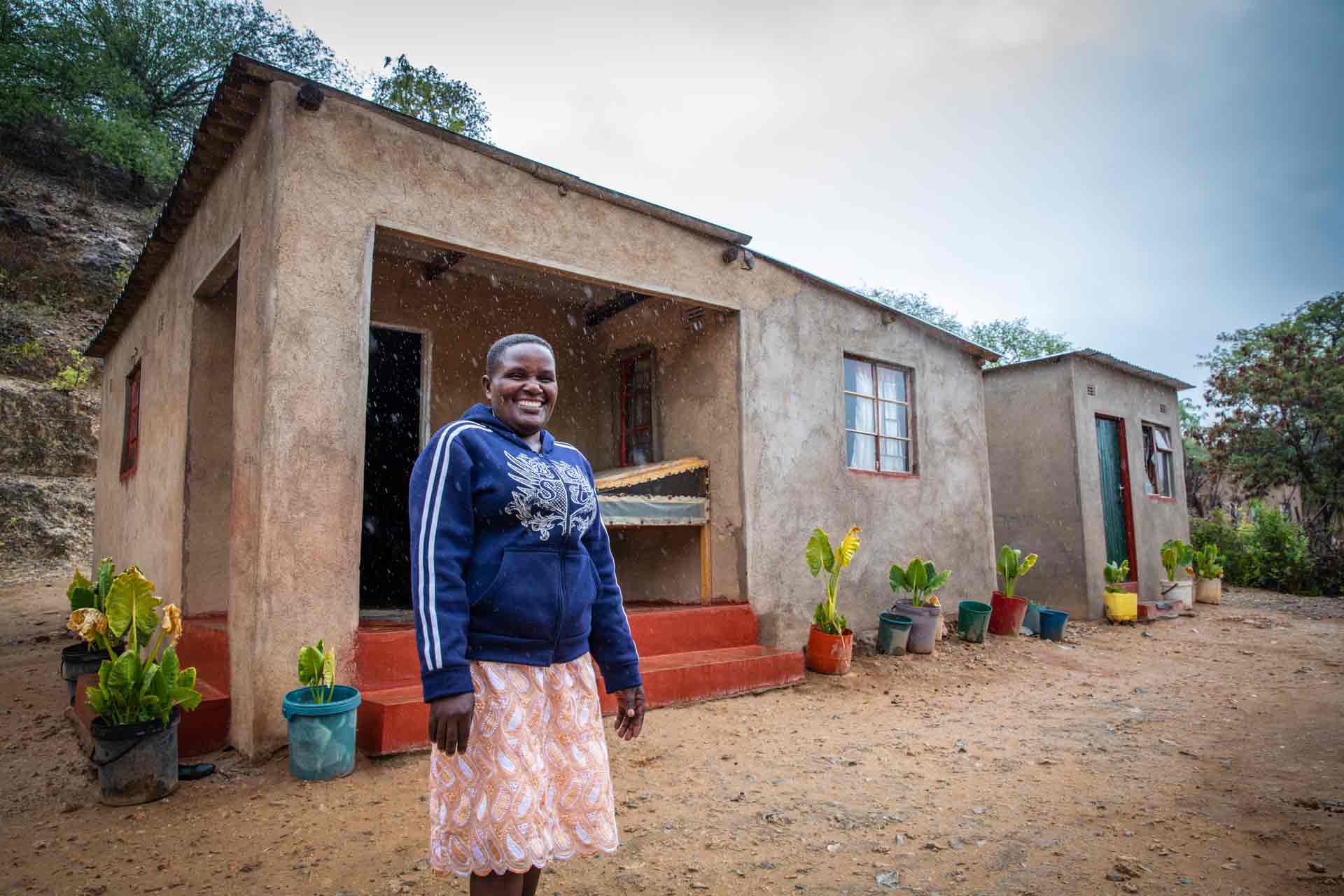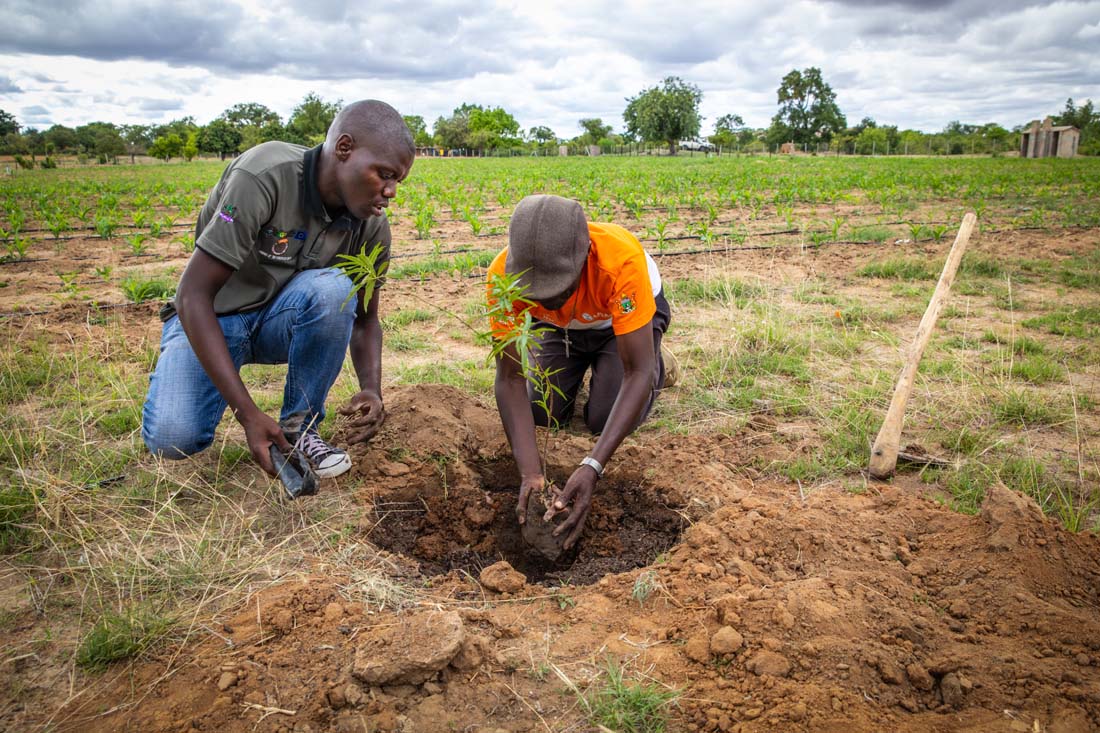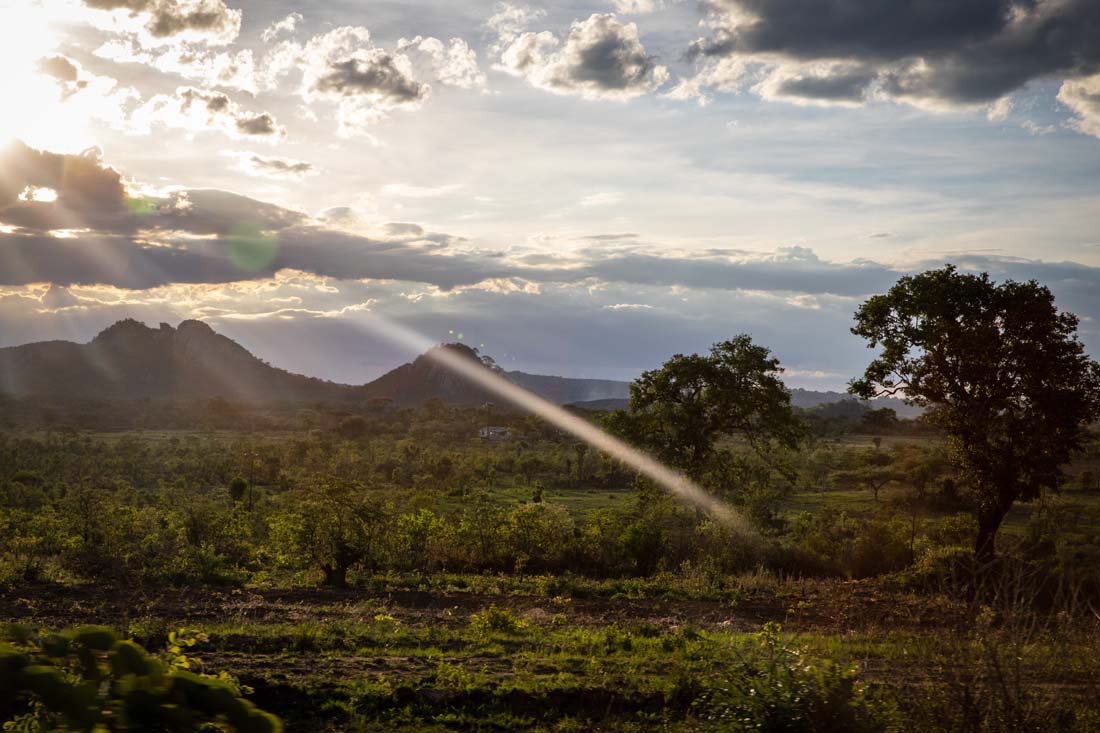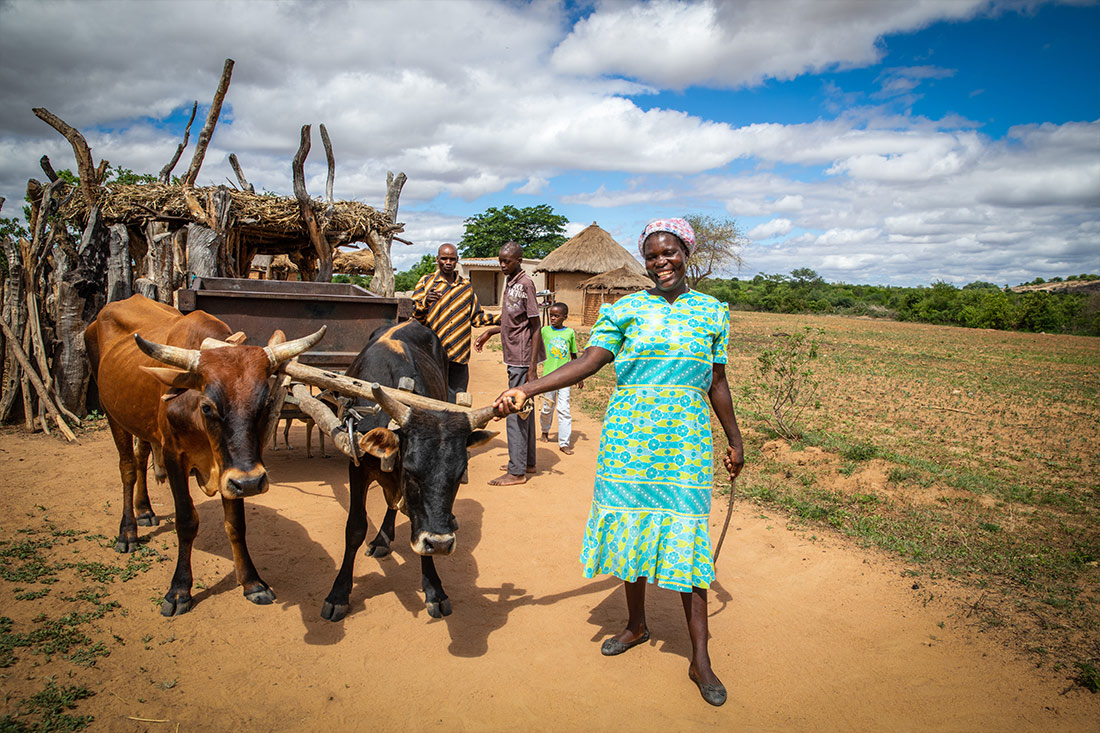
‘We were nobodies’ — family in Zimbabwe changes their future
Story by Kristy J. O’Hara-Glaspie | Photos by Chris Huber
Rosy Maramwidze and Zacks Muchato used to be the laughingstock of their community in Buhera, a district in Zimbabwe’s eastern province of Manicaland.
The incredibly dry and arid area is known as a mini desert, making farming difficult for people like Rosy, 48, and Zacks, 49. The couple had just four small donkeys, which they used to plow small portions of land for the farming they did. But with inconsistent rains and longer periods of drought, if they wanted to water their crops regularly, they had to walk a ways to a river and haul back water bucket by bucket to feed their seeds.
It wasn’t sustainable, and their farming wasn’t fruitful. Because they didn’t yield much from their crops, they had little money and no food to eat. They had to buy almost all their food, which quickly ate away at what little money they had — combined only about US$22 a month — and left little to nothing for other expenses.
“Our children would go to school, but we were not keen on paying school fees. We were happy when they would be shooed away from school for not paying,” Rosy says. Their attitude toward their children’s educational problems wasn’t due to not caring but rather indicative of how difficult and desperate life was for them and the need for every little bit of help. “We would find something small for them to do around the home, or they would go do piecework to help pay.”
But in 2014, World Vision brought the ENSURE program to the Buhera district. ENSURE is a USAID-funded program designed to enhance families’ resiliency and food security through livelihoods and nutrition programs.
“When ENSURE came in 2014, people didn’t have knowledge of how we were going to survive, and we had no assets and very little means of livelihood,” Rosy says.
So people, including Rosy and Zacks, decided to take a chance on something new and participate.
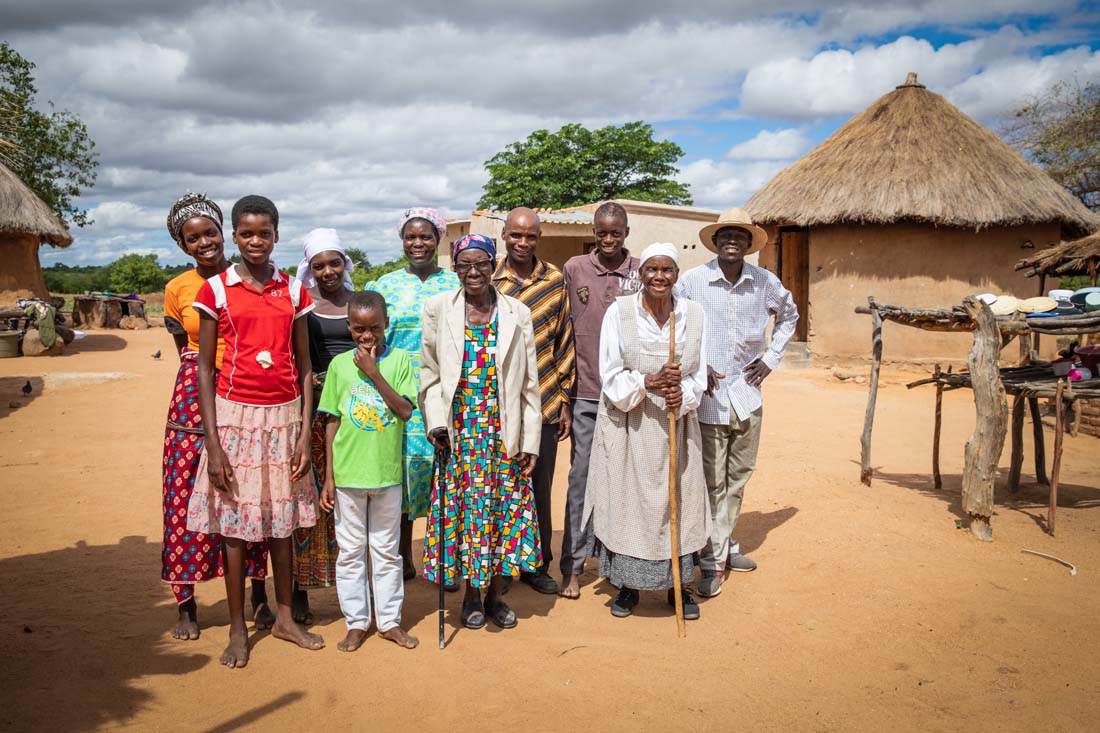
Changes
Initially when ENSURE came, the program began with a supplemental feeding program aimed at women with young children. As the mother of seven children, Rosy was interested in going so she could receive the grain and vegetable oil that would help feed her kids.
“It helped boost the nutrition for our baby,” she says. “We were very pleased. We went through a period of very little rains, so we didn’t have much to give that baby, so when the program came, at least our child was receiving.”
Another new program ENSURE introduced was savings groups, referred to locally as Village Savings & Lending (VS&L).
“We used to say ‘ENSURE is for feeding people,’ and we would attend for the feedings,” Rosy says. “When they later came with the VS&L activity, we were happy to say, ‘Oh, they have another activity — if we join, we’ll be given our first preference when they give us the food.’”
This was a common problem not only in Rosy’s community but also in many of the areas where ENSURE worked. Richard Ndou has served as chief of party overseeing the entire program.
“They’re used to getting free input,” he says. “The government will give them their own inputs. They’ve been spoon-fed, so to speak, for a very long time, and it’s become a habit. Every year, they would come and ask for inputs from the government. In terms of management, there’s not much in terms of capacity building.”
He says that overcoming that mindset was critical to ensuring the program is successful during the lifetime of the grant and for generations to come.
“Our focus is we want to make sure those projects can run on themselves,” he says. “We want to see if they have their own resource to run on their own and what will motivate them to continue to work on their own and address the issues of motivation.”
So while her motives may not have been completely pure, Rosy went to the initial five-day savings group training. She initially thought she may just get food, but instead she started to ask big, potentially life-changing questions.
“We’re being told on how to save our money, and we were concerned with what they meant by saving money,” Rosy says, explaining that saving was a foreign concept to her since she never had enough to get by month to month. “How exactly do we save? What is the method? What is the concept?”
ENSURE staff taught Rosy and her fellow community members how to set financial goals and work toward them. Staff also taught them about the importance of establishing bylaws as a group to help govern and guide their savings activities. Through the savings group, each member would regularly contribute an agreed-upon amount to the group’s collective savings. If someone needed a loan for an expense, they could make a request to their group, which would approve or deny it.
At the end of the savings period in late 2015, all the money the group had saved through the monthly contributions and interest from loans was then divided out amongst the group members in a share-out. Members are then encouraged to buy something tangible to serve as a reminder of their success and encouragement for future efforts. Rosy and each member of the group bought a cot with their earnings.
“Later on, we came back for the second round in 2016, and we were more motivated now because we saw that this type of activity can help us,” Rosy says. “We managed to have our savings, and we bought cows.”
She was amazed, as cows are expensive and extremely helpful for farming. Rosy now fully bought in to what savings groups could do for families.
Another key part of the programs ENSURE introduced was care groups. The groups consisted primarily of pregnant and lactating mothers and aimed to teach healthy feeding practices, such as exclusive breastfeeding through the first six months, incorporating nutrient-rich foods into children’s diets, and eating from all the food groups. The group members would also regularly weigh their children to ensure they weren’t malnourished or stunted. But husbands were also encouraged to attend and take an interest in the health and nutrition of their families, so Rosy and Zacks went together and applied what they learned at home. They also started a small garden with vegetables to supplement their children’s diets.
“We used to think all the food should be bought,” Zacks says. “Now we’re farming our own vegetables and cereal. We don’t need expensive food to survive. We need nutritious food.”
They also learned about the importance of good hygiene and sanitation practices such as building a latrine, so waste doesn’t enter into their water supply, and washing their hands after using the latrine and before cooking or eating. Soon, using money earned through their savings group, the couple even built a latrine and a tip tap, a makeshift sink where one can pour water from a bottle to wash their hands after using the latrine. They also were able to dig and construct a deep well to provide clean water for drinking, cooking, and washing.
“Through the teachings, we were motivated,” Rosy says.
One of the other major aspects of the ENSURE program was connecting community members with local resources that can help them long after the program ends. In Buhera, staff encouraged people to listen to the government agricultural extension workers in their area.
“They’ve always been around, but we never used to take them seriously,” Rosy says. “They’ll come and they’ll go. I won’t even do anything they’ve told us. But now we have a link to say we have good relations with them. We are sisters with them. We have our own government stakeholders and partners. We now listen and appreciate their work because they’re around and emphasizing the trainings.”
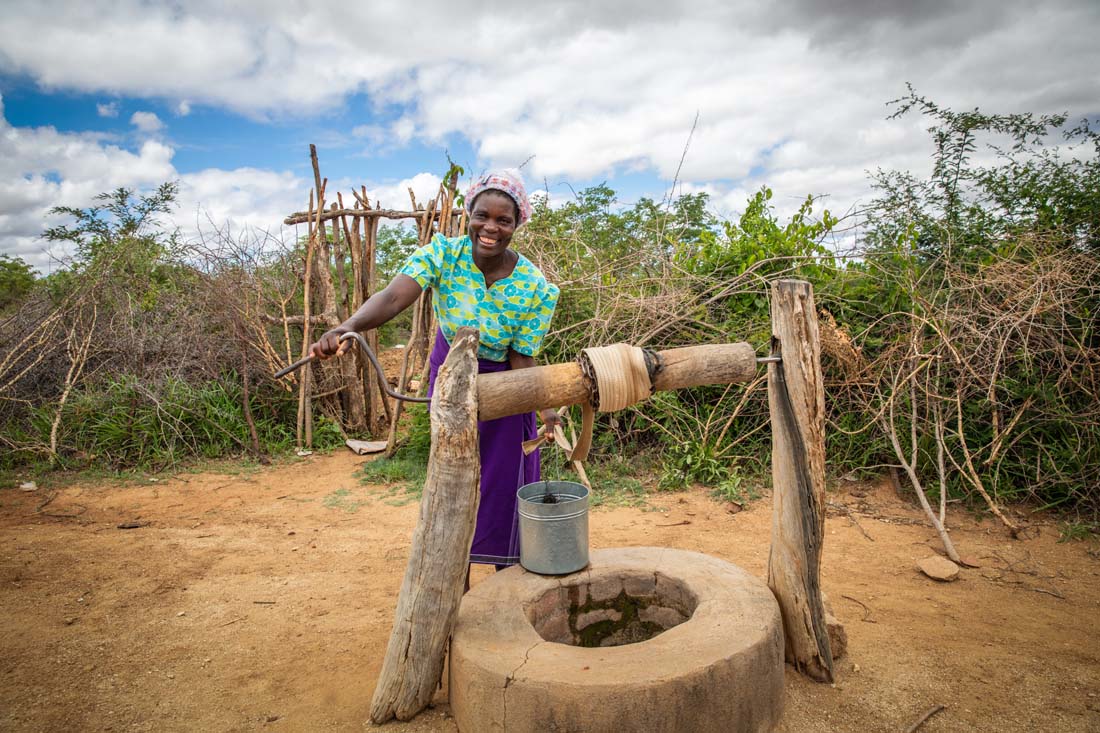
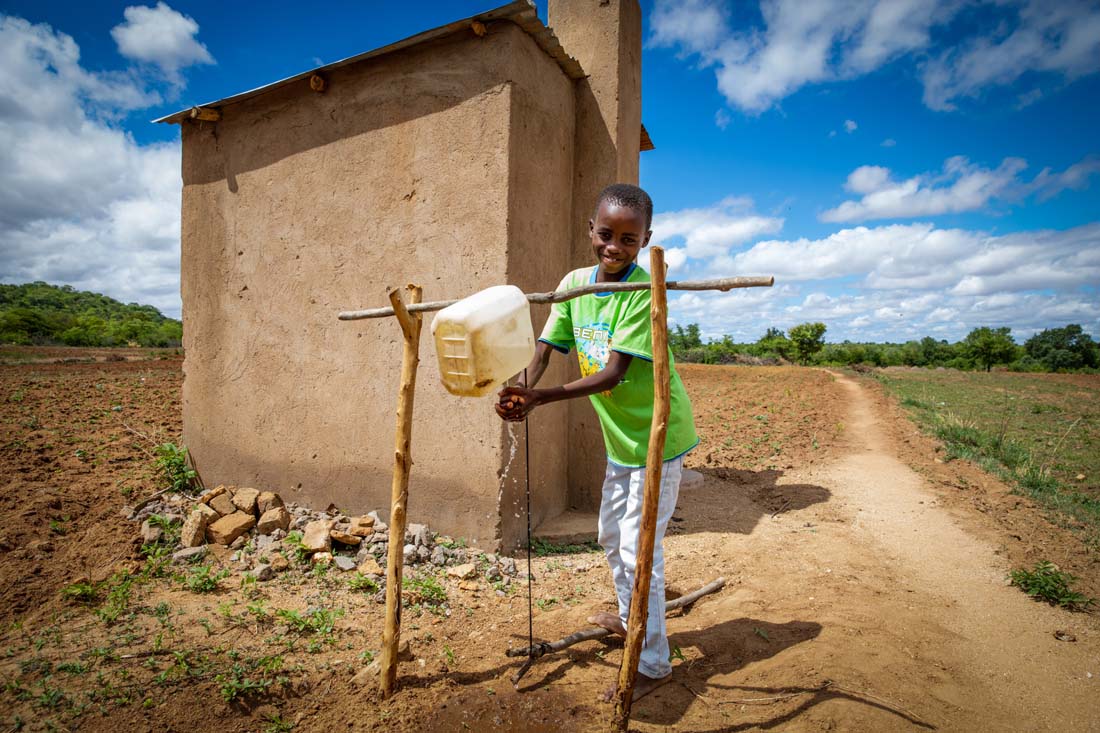
New opportunities
As ENSURE continued, staff introduced more programs, designed to build on each other. One of the new lessons was on the importance of environmental and natural resource stewardship, which involved changing centuries-old mindsets.
“Culturally, when you’re given a piece of land, it was the norm to cut down trees and clear the area because we’re afraid trees that remain will fall on a hut if the rains come,” Zacks says. “[We learned] the trees make the soil stronger and hold the soil together, and your environment will be much safer.”
Zacks and other farmers learned how to clear their land without cutting down all the trees. They were also encouraged to plant trees. At first, they thought they needed to be exotic trees, but further lessons taught that indigenous trees were best. Zacks and Rosy planted a baobab tree as well as fruit trees on their property. Beyond helping the environment, the fruit will provide food as well as possible income as they mature.
The community also learned about the importance of constructing dams and how damming a small water source could make it larger and lead to irrigation opportunities. The community built a weir dam, and Zacks and Rosy purchased a small plot so they could take advantage of the irrigation system and not have to rely on inconsistent rain.
“We’re grateful to ENSURE because we’ve managed to have weir dams, which was unknown to us in the community,” Zacks says. “We can have small plots and have crops year-round because the water is available. We don’t have an off-season now.”
Now he was able to rotate crops between groundnuts, sorghum, millet, tomatoes, kale, onions, and sugar beans throughout the year.
Through their savings group, Rosy and Zacks also joined producer and marketing groups. Through that programming, they learned about another ENSURE program called Purchase for Progress (P4P), which is funded through USAID and the World Food Programme (WFP). Farmers on their own can’t grow enough to sell to a larger client, but through the program, community members are able to farm grains like sorghum and batch their harvests together to sell to a larger market like the WFP.
“We’re thankful to ENSURE staff,” Zacks says. “They managed to connect us to markets.”
Now that they had grains growing on their property, Rosy bought a small oven in 2016 so she could bake buns to sell for an additional income-generating activity. With more income, she and her husband were able to invest in livestock. She now owns five cattle, and he has 15 — all bought through funds from their savings. She also was able to buy 13 goats, and Zacks bought three. On top of that, they bought rabbits and chickens, which they can also sell for income. In 2017, they were able to buy an ox cart — the true status symbol in the community and a sure sign that they had made something of themselves. Their new-found financial freedom breathed new purpose into Rosy to feel that she can make decisions at home.
“ENSURE managed to empower us, especially women,” she says. “Speaking for myself, I was empowered because back then, we believed to survive, we rely on the father of the house. Anything we wanted, we would have to go to him, and say, ‘We want this.’ But now, through my savings, I can buy vegetables and the little things required at the household level.”
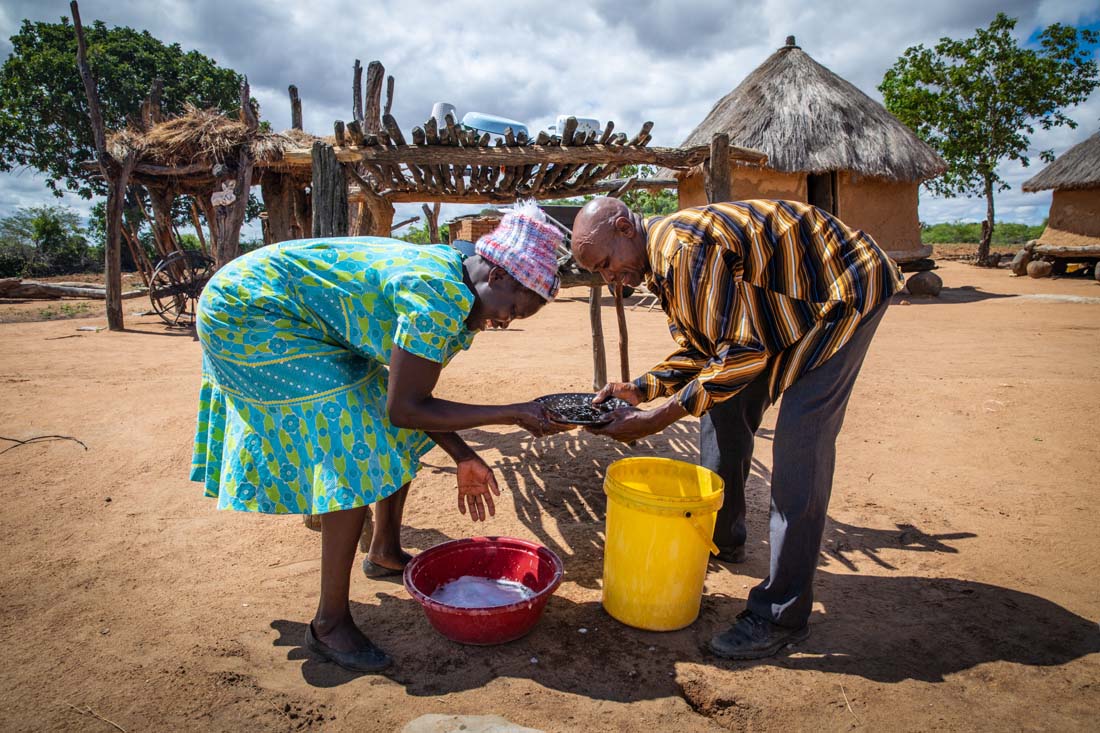
Challenging gender norms
Due to all their success in buying and raising livestock, Rosy and Zacks have had other opportunities and changes come their way.
“I had never been to an agricultural show before — going outside the ward, exhibiting my products,” Rosy says. “They have managed to take me from here and mix me and mingle with people from other districts — dynamic groups — and I’ve learned a lot. I go to shows, and I sell my products at shows, which is important to me because I’ve learned a lot.”
Rosy also went on to be elected by her community as a cluster facilitator, overseeing all the savings groups in her ward, due to her successes. Taking on a leadership role has meant so much to her.
“Initially, in our culture, we just assume men are the ones who lead,” she says. “Women are always looked down upon and couldn’t make decisions. With ENSURE, we have been empowered to lead, and we now take up big leadership roles in the community.”
With so much change and more money now coming in to their family, it could have been a breeding ground for more family conflict. But another aspect of the ENSURE program helps alleviate that stress by teaching gender empowerment to help build stronger, more loving bonds within households. This is done through the work of male advocates like Zacks. He attended the trainings ENSURE offered, and now he continuously works to teach what he has learned to other men in Buhera.
“I have managed to help them demystify some of the myths we’ve been given, such as, back then children weren’t allowed to have chicken liver because it was deemed food for the elders, but we were removing a good part of the diet for our children,” he says. “Through those teachings, we learn that children are supposed to get sufficient food, especially within the first 24 months, because we have the opportunity to reduce stunting.”
Because of lessons like this, across the ENSURE program communities, the percentage of children under age 5 who are stunted has reduced from 28.1% to 19.6%. As head of the program, Richard says, “That’s one of the biggest stunting reductions I’ve ever seen.”
Zacks and other community members also learned about the importance of proper personal hygiene, community sanitation and hygiene, and water safety. In fact, the number of households practicing safe drinking water storage has grown from 53.2% to 97.5% throughout the life of the ENSURE program.
But one of the most radical lessons was how to manage your assets as a family.
“Culturally, we were taught, as a man, ‘I want to sell my cow, and I will sell it, and I want this done, and I’ll do it without consulting anyone,’” he explains. But through ENSURE, he began to consider a different approach. “We learned that you sit down with your wife and your children and discuss why you want to sell that asset and come to an agreement on what to sell.”
He says that it’s important to take this approach to decision-making because other members of the family may have important insights that should be considered, such as how strong a particular livestock is compared to another, or how much milk or egg production one may have relative to the others.
“Behavior change can be tricky,” Zacks says. “It takes time. But at the household level, we’ve adapted some gender-related issues. We can utilize everyone’s contribution to decision-making. It helps to eliminate quarrels.”
While he was quick to adapt the teachings from ENSURE, he said it wasn’t the case for all the men in the community. He often struggled to get other men to understand why they should consider a different way of operating.
“It was a bit difficult. It’s not easy, especially amongst the men,” he says. “For example, if you talk about the distribution of food in the household, the child was just supposed to have gravy. Some of the men still want that to continue, but we continuously have teachings, and they see that most men are changing their minds — ‘No, our children need the meat.’ As a man, it’s not difficult to change a diaper. You just learn how, and assist your wife. Fetch water to help your wife.
“When you share the house chores, it helps create a bond between the husband and the wife. I will know, ‘My wife is tired.’ But it ensures that nobody sends someone to do a lot of hard-working stuff, leaving the chores to be done by one person. That person will be sick and not feel well, especially after giving birth. They need to be taken care. They need to know they are loved because you’ve brought an extra person in the household. It’s not a one-sided job.”
When Zacks first asked to change a diaper and help with dishes, Rosy was thoroughly confused and thought he had lost his mind.
“It was strange for a man to be seen doing so-called women’s duties, so initially, when I saw my husband and he came from these teachings and he explained that he wanted to cook, I was shocked and I said, ‘Could this be real? What is this man doing?’” she says. “We actually had a quarrel because I couldn’t believe this is what he wanted to do. It was strange.”
But in time, she saw that her husband truly wanted to help her and the children and share in the workload. She came to appreciate his efforts as genuine, and in time it improved their relationship, both emotionally and physically.
“It helped improve our sex life,” she says. “ Now, if he’s tired, I’m tired, and no one has more strength than the other. If we’re tired, we’re tired; if we’re not, we’re not. When we’re intimate, it helps improve that bond.”
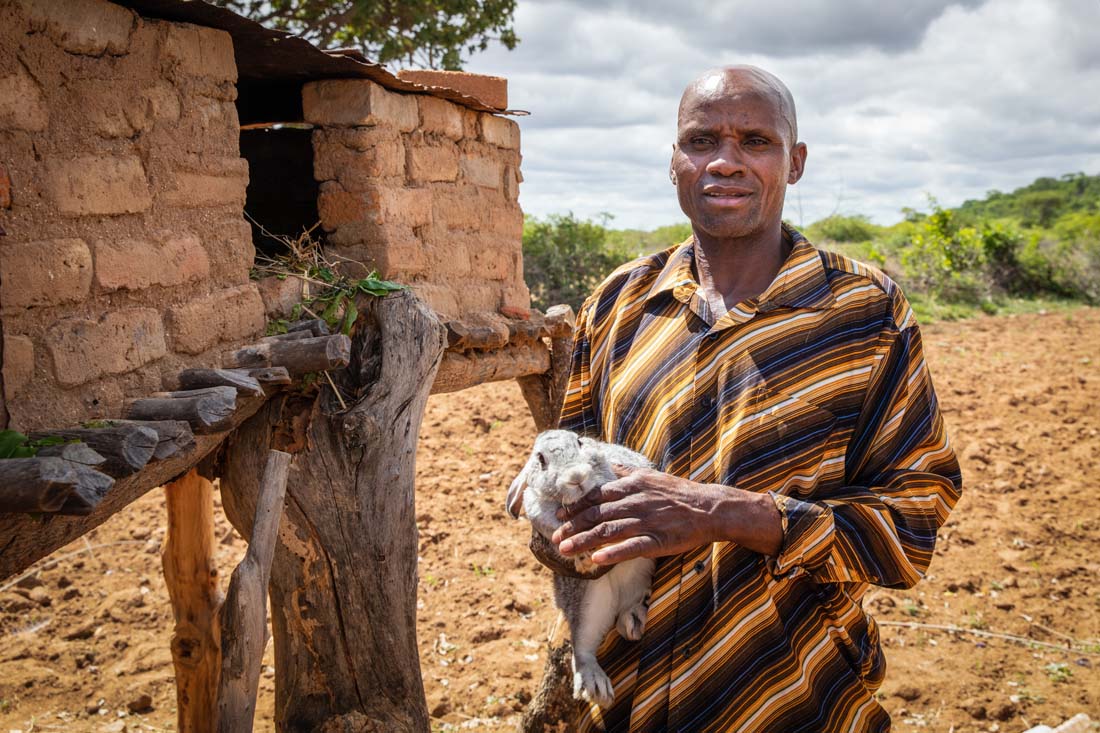
Brighter future
Today, as you walk around Rosy’s and Zacks’ homestead, the signs of progress and prosperity are everywhere: livestock they’ve amassed roaming happily, a latrine they built for improved sanitation and hygiene, proper buildings for livestock to keep them warm and healthy, their ox cart resting against the dilapidated cart they used to use, and a deep well they dug and built themselves to have clean water for cooking, bathing, and watering their gardens. Across ENSURE program communities, the ability to cope with food shortages due to droughts or floods has increased from 28.6% to 45.5%.
“With ENSURE, we got teachings for how we can have different pillars that feed into one goal, which is to reduce stunting and improve livelihoods,” Zacks says.
His family is living that reality now. As a unit that used to make just US$22 a month, now they collectively bring in about US$400 a month. Zacks brings in about $300 from selling his crops as well as some of the livestock. Rosy aims to make more than $100 selling tomatoes and livestock each month, though she says, “If I get US$100 a month, I would not have worked the way I want. I should have more.”
With the income they make, now their children can happily attend school.
“They can fail or they can pass — that’s up to them — but now we are empowered and can afford to pay fees,” she says.
Rosy and Zacks are hopeful that their children will not be defined by the poverty they were born into but instead see what’s possible when you work hard and are open to learning new ways of doing things.
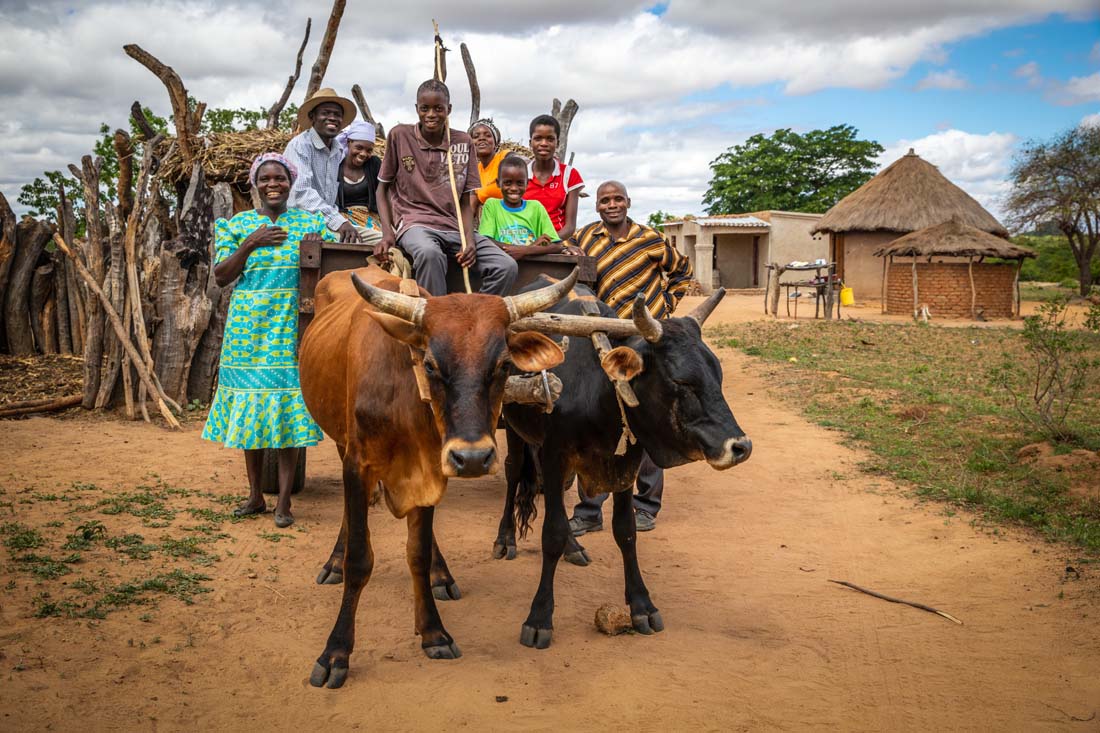
“Our dreams, our hopes are that our children will have a better life than the one that we lived and that they will be able to take care of us in our old age and they have their own families and be better than we were,” Zacks says.
Rosy echoes her husband’s words, and also adds that she wants them to take responsibility for their futures. “We don’t just talk — we talk with action,” she says of her family’s newfound values.
Beyond dreams for their family, Rosy hopes to continue learning so that she can share her knowledge in larger forums so more people can understand “they can come from nothing and be someone in life.” And Zacks hopes to build an irrigation system on his own property to further expand his farming opportunities.
“With ENSURE, we have learned a lot of things,” Zacks explains. “ENSURE managed to combine a variety of activities from health and nutrition to income generation to agricultural production — things we never thought we could combine — but now we’re sustaining ourselves.”
They’re also taking those principles they learned and applying them in their community in new ways completely outside the ENSURE programming. For example community members started a beekeeping project using the dam the community built and built beehives around the dam.
Whatever the future may hold, Rosy and Zacks now feel confident in whatever life throws at them and relish in the newfound respect they’ve earned in Buhera.
“Before we had all the stuff, we were nobodies. People would point at us,” Rosy says. “But now our name is big. We feel delighted, and we feel like we are people amongst other people because we have bought assets.”
She smiles and says with a gleam in her eye, “We are thankful for ENSURE because it has brought us from rags, not to riches, but somewhere near there.”
